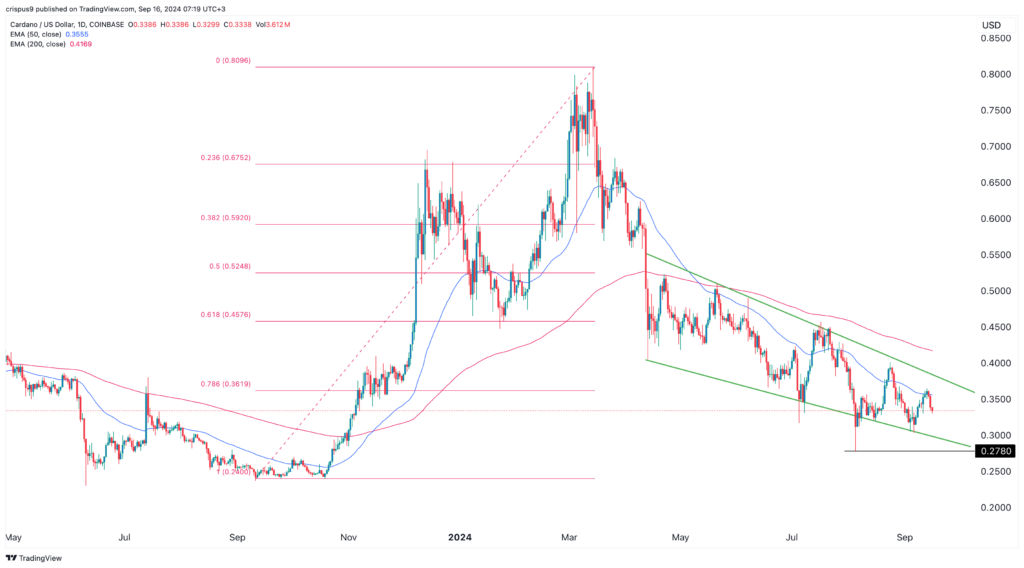Cardano continued its downtrend on Monday as traders waited for the upcoming Federal Reserve decision and as the crypto fear and greed index remained in the fear zone. ADA token fell for three consecutive days to $0.333, down from this month’s high of $0.40 and by 60% from its highest level this year.
Crypto fear and greed index slips
A likely reason why Cardano has retreated recently is that investors have remained fearful even as Bitcoin rose to $60,000. In most periods, Cardano and other coins tend to retreat when there is a sense of fear in the market.
The fear and greed index is an important gauge that looks at several data points like social media mentions, market momentum, volatility, and trends. Data shows that the index has moved to the fear zone of 39, its lowest point in weeks.
This fear is happening because of the recent Bitcoin price action as the coin has remained below the important support level at $60,000. It has also not formed a good uptrend even as gold has jumped to a record high.
Cardano Chang hard fork
The other reason why Cardano has crashed is that the recent Chang hard fork has not had a major impact on the ecosystem.
Chang, the biggest Cardano upgrade in two years, introduced new features to the network. The most important of these features was on-chain governance, where members are now able to elect delegate representatives, also known as dReps to vote on improvement proposals in the ecosystem.
The new approach is expected to make Cardano a more decentralised blockchain where members of the community have a say on most things that happen in the network. Some of these proposals could be related to fees and partnerships.
Historically, cryptocurrencies tend to rise ahead of a major upgrade and hard fork, which did not happen in Cardano’s case.
Ecosystem challenges remain
The main reason why Cardano price has crashed is that investors are increasingly worried about its ecosystem growth and lack of a big developer community.
First, looking at the decentralized finance (DeFi) industry, data shows that Cardano is the 29th biggest player with over $191 million in assets and just 39 applications. Most of these applications have nothing much going on, with over 26 of them having less than $1 million in assets.
MinSwap is Cardano’s biggest player in Cardano’s ecosystem with $50 million in assets. However, according to CoinMarketCap, it handled just $115,919 in volume in the last 24 hours, making it the 90th biggest DEX in the industry. SundaeSwap, the other big DEX in Cardano, handled just $93,000.
These numbers mean that traders are no longer using Cardano’s biggest platforms, which is a big red flag for the ecosystem.
In contrast, newer blockchains are doing much better than Cardano. The best example of this is Coinbase’s Base Blockchain, which was launched in 2023 and has seen robust activity in the past few months.
Data shows that Base has accumulated over $1.5 billion in transactions in the past few months, making it the sixth-biggest player in the industry. Arbitrum, which was launched a few years ago, has also accumulated over $1.7 billion in assets and 702 DeFi developers.
Other networks like Sui, Scroll, Mode, Aptos, and Starknet. have also beaten Cardano in terms of usage and developer interest.
Cardano’s stablecoin volume
More data shows that Cardano has also been beaten in terms of stablecoin usage. Cardano has just $12.6 million in stablecoins, making it the 45th biggest chain. In contrast, Base has $3.48 billion while Sui, Celo, and Fantom have over $361 million, $346 million, and $336 million, respectively.
Stablecoins are very important in a blockchain because they are used to handle transactions in them. A blockchain with no stablecoins is a sign that it has little activity going on.
Cardano also has little going on in terms of DEX activity. It handled just $950,735 in volume in the last seven days. That made it the 35th biggest network in the industry, smaller than Hedera Hashgraph, Near, Sei, and Internet Computer.
Cardano’s futures open interest has also fallen to $185 million from the year-to-date high of over $500 million.

Cardano price analysis

The daily chart shows that the ADA price has been in a strong bearish trend in the past few months. It peaked at $0.8095 earlier this year to a low of $0.3342, below the 78.6% Fibonacci Retracement point.
Cardano has formed a descending channel shown in green. It has also dropped below the 50-day and 200-day moving averages (EMA), which formed a death cross pattern in May 2024.
Cardano has also formed a series of lower highs and lower lows. Therefore, Cardano will likely continue falling as sellers target the next key support at $0.2780, its lowest point point on August 5.
The post Cardano price prediction: No good reason to invest in ADA appeared first on Invezz
 invezz.com
invezz.com